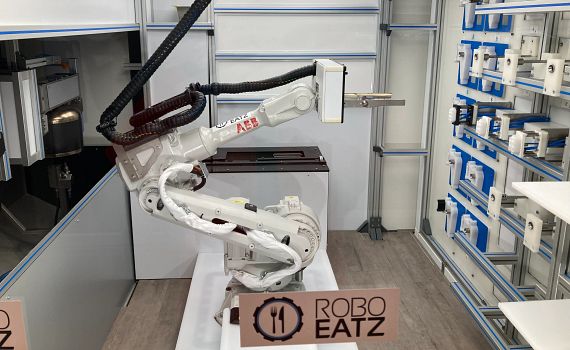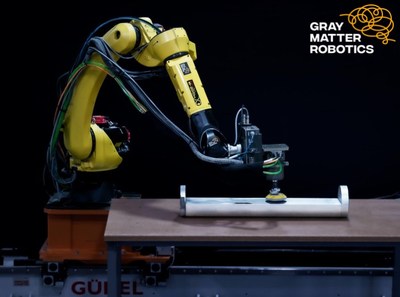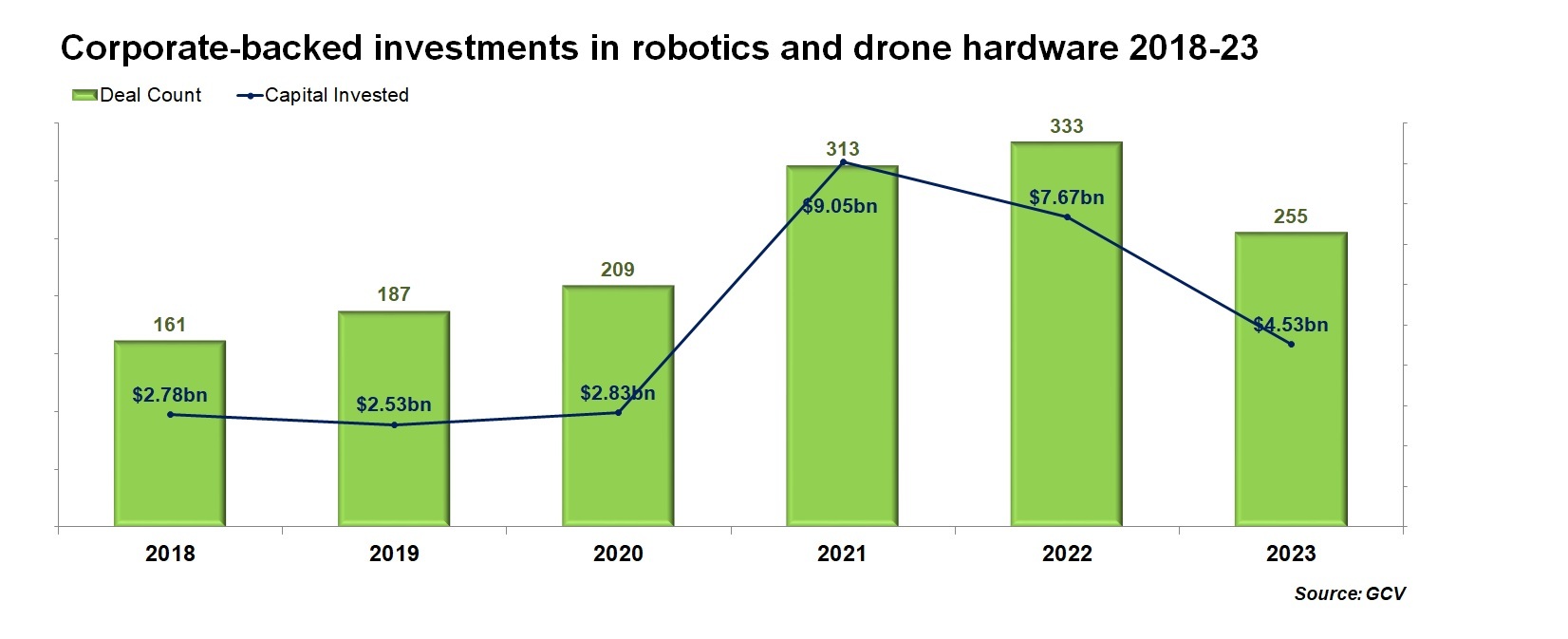From robotic commercial kitchens to companion bots to reduce loneliness, these robot startups — which you can meet at the GCVI Summit — demonstrate why investors are rekindling interest in this sector.

Photo courtesy of FreePik
Investing in robotics startups seems to be coming back into fashion. After a dip in startup funding for the sector in 2023, robotics startups came roaring back at the start of 2024, with humanoid robotics developer Figure raising a $675m series B round from Microsoft, Nvidia and Intel Capital. That came after Norway’s 1X Technologies, which is also developing a humanoid service robot, raised a $100m series B round that brought in Samsung Next as an investor, and China’s Unitree, which makes quadripedal robots, raised a $139m funding round.
Hardware robotics have always been a difficult proposition for investors, and there are several disheartening recent failures, such as Zume, a robotics pizza maker; Karakuri, a robotic chef company; German cobot arm-maker Franka Emika; and Dutch agricultural robot maker Honest AgTech, which all shut operations last year.
But advances in AI have been making investors, including corporate investors, look at robotics startups again. Combining robotics hardware with new generative AI capabilities could open up new possibilities for the sector, investors say.

Meet these robotics companies at the GCVI Summit in Monterey.
More than 30 corporate-backed startups will be exhibiting at the Summit, from sectors including sustainability, energy, nutrition, mobility and generative AI.
At the same time, labour shortages are not easing.
“The ongoing need for companies to address issues related to the supply chain due to population decline and aging in Japan, as well as labour shortages, combined with the rising global interest in generative AI, means that this sector remains an important area for investors,” says Kazuhiko Chuman, general manager of KDDI’s investment arm, KDDI Open Innovation Fund, told Global Corporate Venturing at the end of last year.
A number of robotics companies will be exhibiting at the Global Corporate Venturing and Innovation Summit in Monterey next week, including RoboEatz, a kitchen robot maker, GreyMatter Robotics, which makes industrial robot arms, and companion robot company Intuition Robotics. All have backing from or have collaboration projects with big corporations.
They demonstrate well some of the trends that are driving this new wave of investment in robotics.
RoboEatz: Addressing labour shortages in the kitchen
RoboEatz, claims to make the world’s most advanced autonomous robotic kitchen, capable of making and serving fresh custom-made meals in as little as 30 seconds.
Alex Davidkhanian, a founder and board member of RoboEatz, says that the unique technology of the company and how it is tackling employment shortages in the food service has attracted significant attention from corporate investors.

“We are a maker of a fully automated commercial kitchen that mimics workers and chefs in the kitchens. It enables companies to place a full kitchen and offer menu items to consumers without employing more staff members,” says Davidkhanian.
Davidkhanian says that because many of the team members at RoboEatz have a background in the restaurant industry, their robotics product can respond to issues in the food sector better than its competitors.
“We are not engineers, we are restauranteers that had a whole line of restaurants and realised what some of the problems were in the food industry so reverted to automated solutions to address these issues,” he says. “Our understanding of food operations is what makes us unique.”
He continues: “Some of our players who create a vending machine type of system have the capacity for 30 meals before running out of ingredients – that does not reflect how a typical kitchen is set up so we make around 1,000 meals before you have to replenish the robotics kitchen.”
Davidkhanian became RoboEatz’s board member back in 2020. He previously worked for several corporations including Diageo, a UK-based beverage company where he was a director of corporate strategy and finance director for North America Innovation.
Davidkhanian says that the potential the robotics kitchen industry has to offer is what motivated him to join RoboEatz. “You can see all the different fast-casual restaurants emerging. However, the industry has not been fully automated because it is complex to make food. But the opportunity there is massive and white space ripe for potential disruption that can easily address issues such as labour, food waste and contamination,” he says.
GrayMatter Robotics: Filling the factory labour gap
GrayMatter Robotics is another GCVI Summit startup that is trying to fill gaps in the labour market, this time in manufacturing. The US-based startup develops smart robotics assistants and an autonomous robotic dual arm that helps humans do surface treatment tasks including sanding and spraying on manufacturing lines.
Aryian Kabir, co-founder and CEO at GrayMatter describes the technology in greater detail. “We combine our AI technologies with industrial robots, sensors and tools whilst offering a full package turnkey solution to manufacturers,” he says.
Kabir says that GrayMatter’s easy-to-use technology is what makes it stand out from its competitors. “It’s an autonomous solution that we designed just like an appliance. It’s so easy to use that anyone without knowledge of robotics, engineering, or programming can learn to use the system with very short training,” he says.
The benefits of these robots in the factory lines lead to higher productivity, increased efficiency and greater high-mix operations. Kabir says that the aim of the company is to improve the labour shortages whilst empowering the lives of workers affected by surface treatment tasks.
“So, what GrayMatter is focusing on is offering these autonomous solutions to manufacturers so that they can now have a smart robotic sell a smart assistant to augment their workforce,” he says. “The people who were doing these jobs by hand before now, they have essentially a sidekick where they can simply focus on the creative aspect of the job and these robots they can take care of the tedious and ergonomically challenging tasks.”
“Our goal is to improve the quality of lives for millions of workers around the world and help manufacturers bridge the gap between their demand, capacity and quality of their products,” says Kabir.
Kabir says he was motivated to launch GrayMatter to help change the lives of millions of labour workers. “Workers in the surface finishing and treatment application industry work in extremely tedious and challenging jobs. They are known to get carpal tunnel shoulder injuries after three years of doing these jobs,” he says.
“Younger people who get into these jobs now leave after a couple of months to get a better quality of life. This means that there is a massive labour shortage – which is what we are addressing with our robotics,” he says.

GrayMatter was launched the company in 2020. The company has so far raised $24.1m in funding from backers including 3M Ventures.
Kabir says having a corporate investor on board has helped expand GrayMatter’s customer base. “It has been very helpful to have them on board and work with customers that we are jointly serving, as well as working with their marketing and PR team to get the message to a broader audience,” he says.
“CVCs have been super helpful with getting us into a very specific niche market segment. For us to be able to get access to by ourselves would have been very difficult but with their help, we have been able to accelerate that growth,” says Kabir.
Intuition Robotics: Offering companionship
Though many robots are being created to solve labour and industrial gaps, another area of high need is providing companionship to vulnerable people.
Intuition Robotics is an Israel-based developer of AI companion hardware and software for older people. The startup, which will also be showcasing at the GCV Summit, has developed ElliQ, a digital companion that can be installed in the homes of older adults to provide emotional support and engagement.

“ElliQ helps to reduce loneliness and social isolation for older people giving them healthier and more active lives,” says Dor Skuler, chief executive and co-founder at Intuition Robotics.
Skuler says his motivations for launching Intuitions Robotics came from a desire to tackle a major public healthcare crisis.
“I founded the company to tackle the unmet needs around loneliness. Loneliness is the largest public health crisis in recent years contributing to more deaths and even diabetes. I felt like someone had to do something – and technology has an important role to play in this,” he says.
The Centers for Disease Control and Prevention has noted that poor social relationships characterised by social isolation were associated with a 29% increased risk of heart disease.
Advances in generative AI are allowing them to make a much more sophisticated companion device than would have been previously possible.
“We use the latest AI technology which we made proactive, goal orientated and contextual, which is delivered inside our desktop robot which has body language capabilities too,” says Skuler.
Skuler says that the scalability of its robotics is what makes its product so unique. “We are addressing the huge problem of loneliness using LLM and Gen AI technology. We are making our ideas a reality and shipping out products to thousands of homes already.”
Intuition Robotics, founded in 2016, had backing from an early stage from Samsung Next and Toyota Ventures, and last year added Woven Capital to its roster for corporate backers. The startup has so far raised some $83m in total funding.
Adapting to a challenging investment market
Despite the run of big robotics rounds earlier this year, RoboEatz’s Davidkhanian says that finding investment in this sector is still a challenge.
“Two years ago the investment climate seemed a lot easier,” he says. “But in this climate, it’s difficult unless you are in certain spaces that are getting attention. For instance, AI and ChatGPT companies will get more investor focus than others.”

“So it has been tough, and I don’t know if early investors are still out there because the market dynamic has changed so much,” he says.
Since its launch, RoboEatz has raised $2.7m in funding through angel and institutional investors. Davidkhanian says that the funding will be used to further develop the company’s technology.
“The money has gone through to develop the commercial prototype which we are piloting today,” he says. “We want to commercialise the technology with one of our validated customers and then go for a bigger raise to meet market demand.”
Roboeatz has received investment from ABB Technology Ventures, the corporate venture capital firm of ABB Group. Davidkhanian says that having a corporation specialised in robotics and manufacturing greatly validates the technology Roboeatz is making.
“It’s a great validator when one of your partners is willing to see what this could be and is willing to invest in the future of this company,” he says.
Davidkhanian also notes that robotics companies are taken more seriously by CVCs when the product aligns with their strategic goals. “You get different responses from CVCs depending on their strategy and how we as a company fit in with their goals. In some cases, the fit is great which means they are willing to invest but in other cases, there were too many laters removed from their core business, so they will support our company but not invest,” he says.
Skuler also says that it’s important to find an investor who can align your robotics product with their company values but adds that Intuition Robotics’ position as both a hardware and software company has made it easier to find investment in the market compared to Roboeatz. “I think in the current economic climate, it’s always challenging to find an investor whose goals are aligned with the values of the company – but we have been okay finding investment,” says Skuler. Woven Capital led the company’s $20m funding round last August.
“We have a goal to fuel our growth and we already grew three times compared to last year. To keep on growing we need this capital,” says Skuler.
Skuler says that finding a corporate investor is vital to accelerating a startup’s business. “When you are looking to build a long-term venture that uses a lot of deeptech and requires time to mature – finding a corporate investor that is aligned with your long-term strategy is very helpful,” he says.
“You get access to both patient and strategic capital. Corporate investors also can help accelerate the business,” says Skuler.









